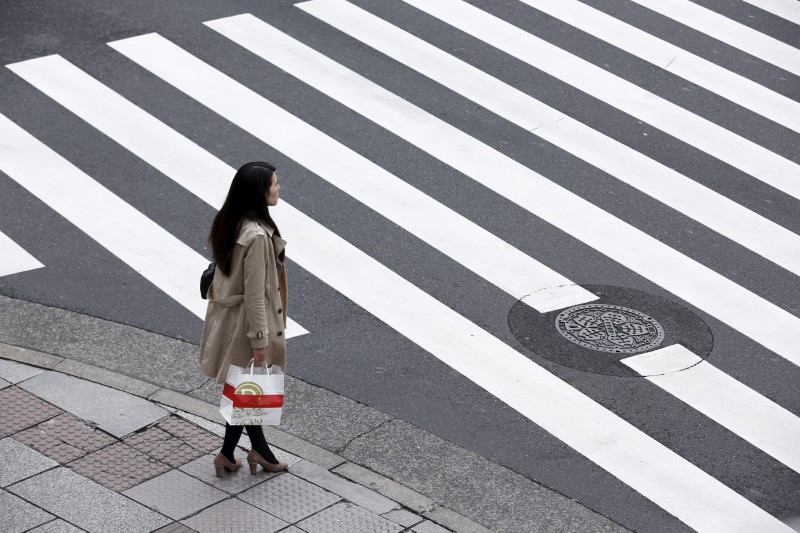
A woman holds a shopping bag as she waits at a pedestrian crossing in the Ginza district in Tokyo, Japan, March 24, 2016. REUTERS/Thomas Peter
December 21, 2018
By Leika Kihara
TOKYO (Reuters) – Japan’s annual core consumer inflation slowed in November, reinforcing market expectations the central bank will hold off on whittling down stimulus for a prolonged period as prices remain distant from its target.
The data drew attention to Bank of Japan Governor Haruhiko Kuroda’s warning on Thursday that rising economic risks will keep the central bank open to the idea of boosting – not trimming – stimulus.
The nationwide core consumer price index (CPI), which excludes the effect of volatile fresh food costs, rose 0.9 percent year-on-year in November, government data showed on Friday. That was below a 1.0 percent gain in October and off market forecasts for a 1.0 percent increase.
“Falling oil prices will likely weigh heavily on inflation,” particularly around spring next year when the drop in fuel costs push down electricity and gas bills, said Takeshi Minami, chief economist at Norinchukin Research Institute.
“As achievement of the price target becomes elusive, the BOJ could be forced to respond if downside risks to the economy heighten,” he said.
In a sign soft household spending is weighing on inflation, the rise in so-called core-core CPI, which strips away the effect of both fresh food and energy costs, slowed to 0.3 percent in November from 0.4 percent in the previous month.
The weakness in the core-core price gauge will be particularly worrying for the BOJ, which focuses on the index for clues on whether strengthening economic growth is changing companies’ price-setting behavior.
Marcel Thieliant, senior Japan economist at Capital Economics, said the slowdown in core-core inflation was a “big disappointment” and could persist as producer prices of consumer goods stopped rising altogether in November.
“The risks to our forecast that inflation climbs to 0.7 percent by the time of next year’s sales tax hike are increasingly tilted to the downside.”
Stubbornly soft inflation has dashed the BOJ’s hopes a solid economic recovery would translate into higher prices, forcing it to maintain its huge stimulus despite unwelcome side-effects such as the erosion of financial institutions’ profits from years of near-zero interest rates.
Adding to the headache for policymakers, Japan’s economic growth contracted in July-September and is expected to rebound only modestly on darkening prospects for exports.
The central bank maintained its ultra-easy policy at a rate review on Thursday, lagging further behind the U.S. Federal Reserve in unwinding crisis-mode stimulus.
The International Monetary Fund has called on the BOJ to maintain its massive stimulus, arguing that the side-effects of prolonged easing are not enough to outweigh the benefits.
“The only game in town is achieving the target. Tightening now is not going to help you get there. They’re very much committed to reaching the target, and we think that’s the right thing to do,” said Paul Cashin, the IMF’s mission chief for Japan.
(Reporting by Leika Kihara; Editing by Shri Navaratnam)

